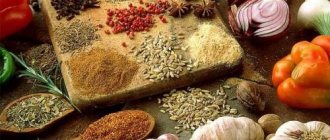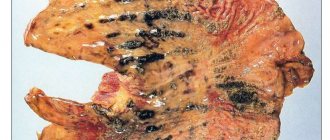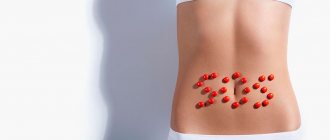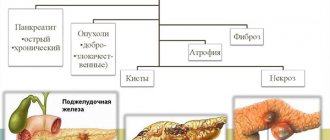- What is intestinal dysbiosis?
- Causes of intestinal dysbiosis
- Symptoms of intestinal dysbiosis
- How to treat intestinal dysbiosis at home?
- Diet for intestinal dysbiosis
- Drugs for the treatment of intestinal dysbiosis
- How to treat intestinal dysbiosis with traditional methods?
| The health of our body largely depends on the functioning of the gastrointestinal tract. Consumption of healthy food in the correct proportions creates the basis for life; disorders at any stage make themselves known in the most unexpected way. |
Medical science knows a large number of gastroenterological diseases that significantly complicate the patient’s life, and therefore are a reason for turning to doctors. Disturbance of intestinal microflora or dysbacteriosis does not apply to such diseases. Its symptoms are not so disturbing and often remain unattended, while the disorder worsens and creates the basis for the development of more dangerous ailments. Therefore, it is important to understand what intestinal dysbiosis is, why it is dangerous and what measures are necessary to normalize the health of the gastrointestinal tract.
What is intestinal dysbiosis?
In the first hours of a person’s life, his intestines are populated with beneficial microflora, bacteria without which the digestion of food and the protective properties of the body will not be possible. Beneficial bacteria traditionally include bifidobacteria, lactobacilli, and bacteroides. In addition to them, the intestinal microflora consists of opportunistic microorganisms, the correct ratio of which with beneficial ones creates that very norm. A sufficient concentration of beneficial microorganisms makes it possible to restrain the proliferation of opportunistic microorganisms (an increase in the number of which has a negative impact on health) and prevents attacks by pathogenic microorganisms. The latter pose a danger in the form of staphylococci, streptococci, Proteus; An example of opportunistic pathogens is the Candida fungus.
Intestinal dysbiosis is a condition in which there is a change in the composition of the intestinal microflora towards the predominance of opportunistic and/or pathogenic microorganisms over the number of beneficial ones. This circumstance leads to disruption of the gastrointestinal tract, weakening of the immune system, and the risk of developing allergic and even cancer diseases increases.
Intestinal dysbiosis is not an independent disease - it either occurs under the influence of external factors and then precedes gastrointestinal ailments, or develops against the background of gastritis, pancreatitis or other diseases that weaken the immune system or require the use of potent medications.
Dysbacteriosis in its development goes through 4 stages; medical correction of health at the earliest stage contributes to the fastest possible recovery.
- Stage I - the decrease in the number of beneficial bacteria in the intestines is assessed as moderate, pathogenic microflora develops minimally, and the symptoms of the disorder are difficult to notice and evaluate;
- Stage II - the decrease in the number of beneficial microflora is assessed as critical, and opportunistic and/or pathogenic bacteria are actively developing; symptoms relate to the underlying disease, if dysbiosis develops against its background, or consist of diarrhea, flatulence, bloating and other uncomfortable, but not extremely painful sensations;
- Stage III - beneficial microflora is suppressed, and the activity of pathogenic microorganisms is active; against the background of complications, inflammation of the intestinal walls, chronic diarrhea and other already painful symptoms occur;
- Stage IV - a noticeable and prolonged predominance of pathogens in the intestinal microflora threatens general exhaustion of the body, anemia and vitamin deficiency, as well as the manifestation of such signs of dysfunction that are dangerous to leave without appropriate attention.
Intestinal dysbiosis suspected if there are symptoms characteristic of various disorders of the gastrointestinal tract, and with the understanding that there have been risk factors in the recent past. This is a reason to contact a medical specialist who will prescribe a set of examinations that will either diagnose dysbacteriosis or otherwise explain the reason for the deterioration in well-being.
General information
Dysbacteriosis (dysbiosis) is a violation of the normal composition and quantitative ratios of the microflora that normally populates the hollow organs and tissues of the body that communicate with the environment: the upper respiratory tract, intestines, skin, mucous membranes. The normal microflora of the body provides protection (creating immunity) from the penetration and rapid reproduction of pathogenic microorganisms, and performs a number of other functions (production of vitamins in the intestines, etc.). Intestinal dysbiosis is most often observed. Intestinal dysbiosis is a condition characterized by qualitative and quantitative changes in the composition of the intestinal microflora. Instead of the normal bacterial flora - lactobacilli, anaerobic streptococci, E. coli, enterococci - putrefactive or fermentative flora, fungi and other microorganisms that are normally uncharacteristic of the intestine, including opportunistic (opportunistic) microorganisms, abundantly develop in the intestine. Dysbacteriosis is not an independent disease, but a special condition of the body (syndrome) that occurs in various diseases (chronic gastritis with secretory insufficiency, chronic pancreatitis, enteritis, colitis, lactase deficiency, celiac disease, etc.). Dysbacteriosis can be caused by long-term uncontrolled use of antibiotics, malignant neoplasms of the stomach and colon, and other diseases.
Causes of intestinal dysbiosis
Intestinal dysbiosis at first does not seem to be a serious disorder. Moreover, it can be temporary and overcome by the body on its own. In particular, the most harmless causes of dysbiosis, after which there is a high probability of spontaneous recovery, are:
- traveler's diarrhea - dysbacteriosis that develops against the background of a change in the usual diet or consumption of water from unusual (but not obviously harmful) sources; happens when traveling abroad, usually goes away upon returning home or after a certain period of adaptation;
- alcohol abuse – dysbacteriosis that develops against the background of alcohol poisoning; in especially severe cases, the patient may need professional help, but often, under favorable conditions, recovery is possible at home, without visiting a doctor; after a few days, the disorder ceases to remind itself of itself;
- seasonal decrease in immunity - in this case it is reasonable and prudent to consult a therapist, but the body can normalize the condition on its own
A more thorough approach, which should be monitored by a qualified specialist, is required by dysbiosis that develops due to the following circumstances:
- systematic nutritional disorder with a predominance of flour, spicy, fatty foods and the lack of sufficient quantities of plant foods and fermented milk products;
- decrease in the body's defenses;
- uncontrolled use of antibiotics, use of strong antibiotics or in high concentrations;
- previous intestinal infections (for example, dysentery, salmonellosis);
- diseases of the digestive system (for example, gastritis, peptic ulcer, colitis, pancreatitis, cholelithiasis);
- previous operations on the stomach and intestines;
- severe immunodeficiencies (for example, with leukemia, AIDS, radiation and chemotherapy).
It should be noted that the idea of the impact on the body of one or more of the above factors should be a reason for the prevention of dysbiosis, that is, taking medications that help maintain normal intestinal microflora.
When to see a doctor?
If you have symptoms of intestinal discomfort (unstable stools, flatulence, etc.), you should be examined by a doctor.
Examination for dysbacteriosis
Dysbacteriosis is usually a consequence of other diseases, so its cause should be determined without fail. In addition to a general medical examination and prescribing routine tests to identify the most common diseases accompanied by dysbacteriosis, the doctor may prescribe an endoscopic examination of the stomach and intestines; ultrasound examination of the liver, kidneys, etc.
There are additional methods for studying intestinal microflora:
- microscopic examination of stool (coprogram);
- bacteriological examination of feces for the presence of pathogenic bacteria (pathogens of intestinal infections);
- Only in the absence of pathogens of intestinal infections is it advisable to examine stool for dysbacteriosis.
Laboratory data from stool testing indicating dysbacteriosis:
- the number of bifidobacteria is less than 100,000,000 cells per 1 g;
- the proportion of atypical Escherichia is more than 10%;
- the appearance of hemolytic microflora;
- the number of opportunistic gram-negative bacilli or Staphylococcus aureus (S. aureus) is more than 10,000 per year;
- the number of fungi of the genus Candida is more than 1000 per year;
- an increase to more than 200,000,000 or a decrease to 1,000,000 in the number of Escherichia coli (E. coli).
Symptoms of intestinal dysbiosis
Symptoms of intestinal dysbiosis mostly fall into the category of nonspecific, that is, those that can occur with a wide variety of diseases and disorders. However, the first signs of a general deterioration in well-being and gastrointestinal function should be a reason to prevent dysbiosis at a minimum and contact a gastroenterologist for a full examination at a maximum.
Warning signs include:
- constant (or frequent) feeling of discomfort in the abdomen;
- periodic and causeless abdominal pain;
- bloating and feeling of fullness in the abdomen;
- flatulence or increased gas production;
- changes in stool, whether diarrhea, constipation or any instability;
- unpleasant taste in the mouth and bad breath;
- periodic and causeless nausea;
- allergic reactions to harmless products;
- loss of appetite;
- general malaise, such as severe weakness, decreased performance, chronic fatigue;
- long-term dysbacteriosis not only leads to negative changes in the gastrointestinal tract, but also manifests itself externally - in the deterioration of the condition of the skin, hair, nails;
- Intestinal dysbiosis is directly dependent on the state of general immunity, and therefore can manifest itself as frequent colds.
How to treat intestinal dysbiosis at home?
Treatment of dysbacteriosis should begin with a visit to the medical office. After reviewing the patient’s complaints and medical history, if dysbiosis is suspected, the doctor will prescribe a bacteriological analysis of stool and other studies of the gastrointestinal tract, if necessary.
If the diagnosis is confirmed, the patient will be shown the following actions as part of treatment therapy:
- adherence to a diet - creates conditions for the normalization of intestinal microflora, promotes the engraftment of bifidobacteria, lactobacilli, bacteroids introduced into the intestine from the outside through probiotic capsules;
- taking probiotics if tests show a disruption of the normal microflora without the addition of pathogenic microorganisms; probiotics are powder or capsules with it, which contain the maximum amount of bifidobacteria, lactobacilli, bacteroides, which will populate the weakened intestines;
- taking prebiotics - substances that create an environment in the intestines that is beneficial for the colonization of beneficial bacteria; often included in combination preparations that combine both prebiotics and probiotics; may also be contained in food products (chicory root, Jerusalem artichoke, dandelion greens, garlic, leeks, onions, fresh asparagus, wheat bran, wheat flour, bananas);
- taking specific fermented milk products - enriched with lactobacilli and bifidobacteria, which have a beneficial effect on the intestinal microflora; relieve dysbacteriosis, strengthen the immune system and normalize the activity of the gastrointestinal tract; they usually contain a combination of prebiotics and pribiotics;
- taking antibiotics is necessary if tests show the predominance of pathogenic microflora of a bacterial nature; after a course of antibiotics, a course of probiotics must certainly follow to restore the flora; it is important to understand that an uncontrolled combination of two types of drugs mutually excludes the effect of each other;
- taking antifungal agents is necessary if tests show the predominance of pathogenic microflora of a fungal nature; the course of drugs should be supplemented with a course of probiotics, however, an uncontrolled combination of two types of drugs can also have a mutually exclusive effect;
- full treatment of the disease that is the cause of dysbiosis, if the history or recent examinations indicate its presence.
It should be noted that self-administration of drugs that normalize intestinal microflora is safe if the instructions are followed and only if the cause of the ailment is indeed dysbacteriosis. Self-medication is acceptable, but not recommended, because the symptoms of dysbacteriosis are non-specific and only laboratory diagnostics can determine their nature. Nevertheless, probiotics can be used and even help, but there is also a significant risk that the malaise is not caused by dysbiosis or that dysbiosis itself is a manifestation of a more serious disease.
Natural drug substitutes
If the patient has a mild form of dysbiosis or individual intolerance to drugs, natural sources of beneficial bacteria can be used.
It is recommended to use the following products that saturate the body with prebiotics:
- fermented milk products;
- chicory, millet, prunes, dried apricots;
- apples, bananas, currants, plums, strawberries.
Probiotics and synbiotics are found in the following foods:
- flax, corn;
- grapes, figs;
- cabbage, onions;
- dairy products.
Products rich in antiseptic substances:
- onion, garlic, ginger;
- dill, fennel, cardamom;
- different types of nuts;
- blueberries, rowan.
The main benefit of the products is that there are no restrictions on consumption. Even in large quantities, the products do not cause a negative reaction for the gastrointestinal tract.
Diet for intestinal dysbiosis
Particular attention should be paid to your diet both for a person who has already encountered intestinal dysbiosis , and under circumstances that are conducive to it.
A diet for dysbacteriosis can be roughly depicted in the form of a number of restrictions and allowances:
| General direction | |
| bland, sticky, slimy food with no added spices and limited salt | products that stimulate the secretion of gastric juice, promoting irritation of the mucous membranes |
| Can | It is forbidden |
| Slimy rice porridge or white rice stew (water) | Spices |
| Heat-processed food | Millet, bulgur, sprouted grains, bran coarse fiber |
| Fresh cucumbers, dill, parsley, cilantro in limited quantities | Savory snacks |
| Broths and soups made from chicken or white fish with a limited amount of potatoes, vegetables, rice | Fried foods |
| Lean varieties of meat and fish, steamed, consumed in chopped form | Foods high in animal and fish oils |
| Steamed cutlets or meat soufflé | Seafood |
| Low-fat fermented milk products | Sausages, frankfurters, deli meats |
| Cottage cheese and kefir without the addition of sorbitol, maltitol, fructose | Smoked meats |
| Honey or white sugar as a sweetener | Dishes in marinade, such as shish kebab or grilled fish |
| Canned vegetables with vinegar, sauerkraut | |
| Mushrooms | |
| Sour fruits and berries, fresh vegetables | |
| Bread made from yeast dough, sweet and savory pastries | |
| Alcoholic drinks, up to light cider or wine | |
| Fermented drinks - homemade wine, kvass, sour oatmeal jelly | |
It is recommended to draw up a more specific menu for the period of treatment or prevention with the attending gastroenterologist or nutritionist. The names of acceptable products may vary depending on the acute or recovery stage of dysbiosis.
How to treat intestinal dysbiosis with traditional methods?
Treatment of intestinal dysbiosis with folk remedies can be an alternative or complement to traditional medicine methods, and the effectiveness of this approach is assessed individually. It is recommended to discuss the advisability of using traditional recipes at an appointment with a gastroenterologist. The following recipes are popular:
- black pepper - 3-5 peas of black (not allspice) pepper should simply be swallowed without chewing and washed down with a small amount of water; this must be done before meals or on an empty stomach, repeat daily for several weeks;
- garlic - 1-3 cloves of garlic should be eaten on an empty stomach and in the evening 2 hours after eating, washed down with yogurt;
- garlic oil - crush a medium-sized head of garlic into a pulp, place in a glass jar and pour in 200 g of vegetable oil, close; leave for 10 hours in the refrigerator; Before use, dilute the oil with lemon juice in a 1:1 ratio, take 1 tbsp three times a day. half an hour before meals for several months;
- garlic kefir - chop 2 heads of garlic and 5 medium onions, pour in a liter of kefir, stir, close the lid and place in the refrigerator for 5 days; after the allotted period, take 1 tbsp three times a day. during the week;
- eucalyptus - 3 tbsp. dry eucalyptus, pour ½ liter of boiling water, close, leave until cool, strain; take ¼ cup three times a day for 14 days.
Where can I buy
Natural remedies for intestinal disorders of plant and animal origin can be purchased in the Russian Roots online store. They have sealed packaging and can be sent by mail even to the most remote regions of the country. Residents of the capital and Moscow region have access to a courier delivery option. You can independently buy medicinal formulations or individual ingredients in the capital’s herbal pharmacies “Russian Roots”.
Attention! All materials published on our website are protected by copyright. When re-publishing, attribution and a link to the original source are required.











